|
|
|
Sort Order |
|
|
|
Items / Page
|
|
|
|
|
|
|
| Srl | Item |
| 1 |
ID:
106675


|
|
|
|
|
| Publication |
2011.
|
| Summary/Abstract |
The amazing scenes that were beamed from Cairo's Tahrir Square in January and February 2011 conveyed an important revelation about the ingenuity and resourcefulness of the human spirit. In particular, they highlighted the miraculous power of joint public action not only to carve out spaces for freedom, but to forge a new shared identity which is indispensable for the establishment of a durable democratic order. No less significant, however, is that revolutionary action by pro-democracy insurgents has provided concrete answers to many puzzles that had exercised democracy theorists and Middle East experts for decades. By showing how such action can overcome the divisions and obstacles theorists have seen as an impediment to democratisation, the preoccupation with 'prerequisites' for democracy has been revealed as a diversion. From the American Revolution to Tahrir Square, pro-democracy revolutionary action has the power not just to overthrow tyranny, but also to refashion the nation, starting with the revolutionaries themselves. It can also 'overthrow' theory.
|
|
|
|
|
|
|
|
|
|
|
|
|
|
|
|
| 2 |
ID:
106676
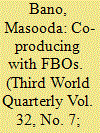

|
|
|
|
|
| Publication |
2011.
|
| Summary/Abstract |
Forging partnerships for development is one of the eight Millennium Development Goals. While faith-based organisations (fbos) are receiving growing attention within development policy as important non-state service providers, they are assumed to be less conducive to forging partnerships with governments or development organisations than secular ngos due to their allegiance to specific religious beliefs. Analysing the dynamic of engagement between the state and madrasas (the most prominent fbo in the Muslim world) in six countries across two geographical regions-the Middle East (Egypt, Syria, Turkey), and South Asia (Pakistan, India, Bangladesh)- the paper counters the assumption that fbos are less likely to enter into negotiations, demonstrate flexibility, and engage in the strategic bargaining often involved in forging such partnerships. Like ngos, fbos respond to socio-political and economic incentives and enter into a variety of relationships with the state, ranging from co-operation to conflict. The defining feature in building a cooperative relationship is the level of trust between the negotiators on the two sides.
|
|
|
|
|
|
|
|
|
|
|
|
|
|
|
|
| 3 |
ID:
106672
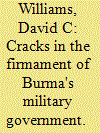

|
|
|
|
|
| Publication |
2011.
|
| Summary/Abstract |
Despite holding recent elections, Burma's military government does not intend to relinquish power; its new constitution guarantees the army the right to do whatever it wants. Democracy will therefore not come to Burma through legal, peaceful, incremental steps. Instead, democracy will come to Burma outside the legal process, because the basis for the regime's power has changed, becoming markedly weaker. When it first seized power in 1961, the military was united and therefore able to rule through coercion alone. In the past several decades, by contrast, the generals have increasingly sought to purchase support by giving income and resource streams to key players. But if people support the regime only because it pays them, they will stop doing so when it stops paying. In recent years the regime has alienated many traditional supporters by taking away the income and resource streams on which they had come to rely. As these groups become alienated from the top generals, they may turn to each other to forge new deals, and ultimately some may try to enlist the people as political allies. Burma therefore fits the most common pattern for democratisation: it will come through elite defections rather than popular insurrection.
|
|
|
|
|
|
|
|
|
|
|
|
|
|
|
|
| 4 |
ID:
106678


|
|
|
|
|
| Publication |
2011.
|
| Summary/Abstract |
Neopatrimonialism is a concept that has predominately been applied to describe governance in sub-Saharan Africa. Recently, however, it has also been used to describe governance in states from other world regions. However, scholars have rarely attempted systematically to compare neopatrimonial rule in different regional settings. This paper aims to narrow this gap by examining the effect of neopatrimonialism on the tax administration as a core state function in six countries from three different world regions: Argentina, Venezuela, Indonesia, the Philippines, Kenya and Zambia. We conclude that neopatrimonialism is a valuable concept for comparative area studies with the potential to foster dialogue on the 'state in operation' across the regional divide. Nevertheless, several indicators are more valid for some world regions than for others. We find that there is no systematic relationship between neopatrimonial trajectories and the strength of tax administration. Individual actor decisions influence the outcomes of neopatrimonialism substantially.
|
|
|
|
|
|
|
|
|
|
|
|
|
|
|
|
| 5 |
ID:
106677


|
|
|
|
|
| Publication |
2011.
|
| Summary/Abstract |
There is a growing body of research on religion and development, primarily from development scholars and practitioners. In many ways this represents a new departure for development studies, which has been largely uninterested in religion in the past. This growing interest can be explained through a number of inter-linking factors, including the persistence of religion in much of the world, and the sense that existing approaches to development have been ineffective. In reviewing the literature we put forward three broad criticisms. First, it is instrumental in its approach-it is interested in understanding how religion can be used to do development 'better'. Second, it has a narrow focus on faith-based organisations, which is in many ways a consequence of the need to understand religion instrumentally. Third, it is based on normative assumptions in terms of how both religion and development are conceptualised: religion is understood to be apart from 'mainstream' development, while development is defined as that thing that development agencies do. In making sense of these criticisms we emphasise the extent to which the recent interest in religion and development has come from donors and development agencies. We found little evidence of academic research on religion and development prefiguring the interest of the World Bank or bilateral agencies. The article concludes with some suggestions of how to move forward.
|
|
|
|
|
|
|
|
|
|
|
|
|
|
|
|
| 6 |
ID:
106673


|
|
|
|
|
| Publication |
2011.
|
| Summary/Abstract |
This research article argues that security challenges in post-conflict Liberia cannot be addressed effectively without synchronising current stabilisation policies with the implementation of development fundamentals. The article explores key strategic sectors of the Liberian economy and their impact on the security and development dimensions of peace building. The political economy of post-conflict Liberia has not structurally modified an economic model which relies on the concessionary system and the extraction of raw materials at the expense of developing productive sectors which could be used to secure sustainable livelihoods. It is suggested that a shift in the political economy pursued by national and international actors is needed to link current peacebuilding efforts to sustainable development processes; one policy measure recommended to achieve such a goal is enhanced support for land reform and small farmers' rights.
|
|
|
|
|
|
|
|
|
|
|
|
|
|
|
|
| 7 |
ID:
106679
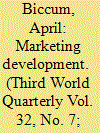

|
|
|
|
|
| Publication |
2011.
|
| Summary/Abstract |
Politics and culture, once considered separate, are now fusing in new and interesting ways. Political activism is becoming popular, particularly through the expansion of a new kind of development advocacy made highly visible through celebrity involvement. Theorists of globalisation celebrate the democratisation of civil society made possible by new information and communications technology; critical theorists will note the various ways in which ict ambivalently makes the contradictions in global capitalism more obvious and has become the means by which globalisation is contested. Some metropolitan governments have sought to capitalise on this new knowledge economy by making knowledge for development part of their strategies to produce 'global citizens' necessary for the global economy. This paper examines the linkages between celebrity and government-funded development advocacy in Australia, which comprise the introduction of free market principles to form a marketing campaign for neoliberal globalisation.
|
|
|
|
|
|
|
|
|
|
|
|
|
|
|
|
| 8 |
ID:
106671
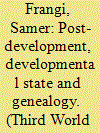

|
|
|
|
|
| Publication |
2011.
|
| Summary/Abstract |
This article investigates the fate of two trends in development studies-post-development and the 'developmental state'-in order to question the critical purchase of the genealogical mode of critique in this discipline. These two trends enact a critique of the orthodox discourse of development that problematises its understanding of history, self-perception and practical implications and is akin to a genealogical form of critique. Yet the success of these trends in the discipline of development has been relatively minimal, compared to the insights it has generated in other academic disciplines. This outcome raises questions as to the problem-space of development and the structure of the arguments in this discipline. More specifically, the article argues that the prescriptive bent of this discipline imposes specific requirements on critical discourse, requirements that make it less amenable to this form of genealogical critique. The article concludes on the potential insights of this form of critique when filtered through the prescriptive bias of this field.
|
|
|
|
|
|
|
|
|
|
|
|
|
|
|
|
| 9 |
ID:
106674
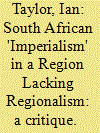

|
|
|
|
|
| Publication |
2011.
|
| Summary/Abstract |
The expansion of South African capital throughout southern Africa notwithstanding, the values and type of regionalism that Pretoria (at least rhetorically) wishes to promote in the subcontinent through the Southern African Development Community (sadc) jars considerably with the extant modalities of governance in many of the states in the region. While market-led integration may be moving apace, political commitment to any supranational regional project remains-and is likely to remain-muted and arrested. South Africa's ability to thus become an alleged political 'leader' of southern Africa and/or exercise 'imperialism' is less significant than many think or fear. Studies of regionalisation in the region need to be grounded firmly within the realm of political economy.
|
|
|
|
|
|
|
|
|
|
|
|
|
|
|
|
| 10 |
ID:
106680


|
|
|
|
|
| Publication |
2011.
|
| Summary/Abstract |
Poverty, inequality, unemployment, torture and corruption were among the main reasons why millions of Egyptians protested to end 30 years of Mubarak's rule in January 2011. The speed with which the regime has fallen and its fragility surprised the world. This is mainly because of the false image of a stable, prosperous and progressive Egypt propagated by the state, ignoring another Egypt, a poor, suffering and repressed one. The failure to see the latter Egypt led to the fall of the former. The aim of this article is to tell a 'tale of two Egypts' by contrasting the experiences and voices of poor Egyptians with the misleading figures reported by the state. The analysis shows how the state was able to provide Egyptians with growth without equity, education without inspiration, employment without security, health services without care and voting without any real impact on political processes.
|
|
|
|
|
|
|
|
|
|
|
|
|
|
|
|
|
|
|
|
|